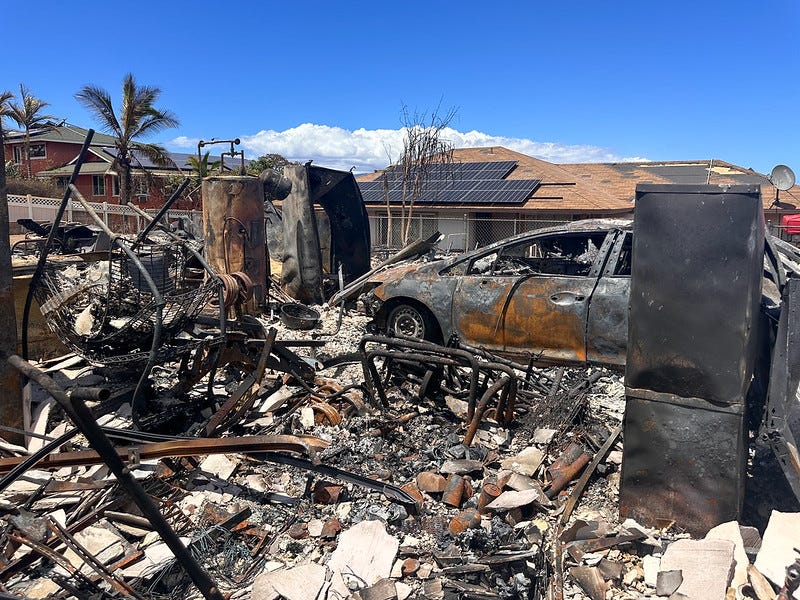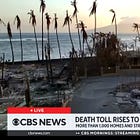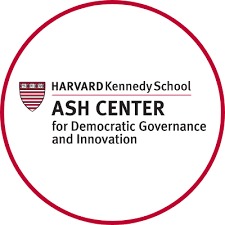
In another reminder that The Kids These Days … Are All Right, the state of Hawaii and youth activists announced Friday that they had reached a “historic” settlement in the kids’ lawsuit on climate, saying it’s the first of its kind anywhere in the world. And it’s a hell of a good outcome, requiring Hawaii to eliminate greenhouse gases from its transportation sector by 2045 or sooner.
And it’s in a state so recently scarred by its own climate disaster, last summer’s deadly Maui wildfires, which killed 101 people and left thousands homeless.
The agreement settles the case of Navahine v. Hawaii Department of Transportation, filed two years ago to force the state to live up to its 1978 hippie greenie constitutional amendment (thank Crom) stating,
Each person has the right to a clean and healthful environment, as defined by laws relating to environmental quality, including control of pollution and conservation, protection and enhancement of natural resources.
A similar provision in Montana’s constitution was the basis for last year’s court victory by another group of terrific young people, but this is a much bigger win. The Montana case sought to force the state to consider climate impacts when approving energy projects, while the Hawaii settlement will lead to the decarbonization of the state’s transportation sector, the state’s biggest source of greenhouse emissions.
The lawsuit argued that the state violated the rights of the plaintiffs by promoting highway construction almost to the exclusion of promoting clean, electric public transport and other alternative transportation.
Another key difference between the two suits: Where Montana officialdom reacted with flagrant pissiness to the lawsuit and its outcome, Hawaii leaders actively negotiated the agreement with the plaintiffs and their representatives. And those leaders, mostly Democrats, are now flat out celebrating the settlement too. In a statement, Hawaii Gov. Josh Green (D) said, “The passion demonstrated by these young people in advocating for a healthy, sustainable future for their generation and those to come is laudable.”
Many of the 13 kids — the youngest was nine when the case began — are Native Hawaiians, and as Green’s statement notes, Hawaii’s indigenous youths are “already experiencing climate change harms to their well-being and their ability to perpetuate cultural practices.” Hawaii officials, Green said, sought to “embrace the government’s kuleana (responsibility) to lead the way on bold and broad climate action.”
As the Washington Post reports (gift link), Hawaii Director of Transportation Ed Sniffen also praised the plaintiffs for their willingness to “speak out about something they really believe in,” and acknowledged that progress on climate might not always be easy, and some of the necessary changes might “piss some people off.” There could be impacts “on mobility in different areas that are going to be difficult, but better for the environment.”
Or as Sniffen put it in the settlement announcement, “Burying our heads in the sand and making it the next generation’s problem is not pono.” I’m frankly kind of glad he didn’t translate, because it’s good to look things up sometimes: As the Source of All Knowledge explains, “pono” is usually translated as “righteousness,” but it’s a key concept in Hawaiian culture, with one Hawaiian dictionary including “six meanings and 83 English translation equivalents.”
So what’s in this agreement? It’s a LOT. It certainly helps that Hawaii already has an existing commitment to decarbonization by 2045 or sooner, but the settlement’s terms are enforceable in court, not just targets. As WaPo explains, the state must now create a plan to decarbonize transportation, with five-year interim targets that will be updated every five years through 2045, or ideally sooner.
That’ll include decarbonizing not only road transportation and building up public transport, but also transitioning to net-zero carbon emissions in marine and air transportation within Hawaii — meaning boats and flights from one island to another. Happily, battery-powered aircraft for relatively short hauls are already coming on the market. Hawaii lacks the power to regulate ships and planes arriving from outside the state, but its regulations — and those in other states — will pressure such carriers to get their climate shit together too, as professionals put it.
The plan must also improve walkability and bike paths. Also too:
Under the plan, Hawaii’s Department of Transportation will also provide $40 million for public charging stations for electrical vehicles by 2030 and establish a volunteer youth council to regularly advise the department.
Why yes, you may now cheer and urge on the young people where you are, too!
As in the Montana case, the kids in Hawaii were represented (or put up to it, if you work for an oil company, God help you) by climate nonprofits Earthjustice and Our Children’s Trust, which has launched other lawsuits to protect the future of young folks in Alaska, Virginia, and Utah. Two down, three to go!
It’s a hell of a win, and yet another reminder that you should elect Democrats if you want to clean up the air and improve public health, with the side benefit of improving transportation and keeping the planet hospitable to large mammals like the Hawaiian monk seal and Hawaii-born folks like Barack Obama, Sen. Mazie Hirono, and the Editrix’s Commie Mom. (Oh! And Bruno Mars, Bette Midler, Jason Momoa, and golfer Michele Wie!)
Let’s see a lot more of this, please.
Open thread!
[WaPo (gift link) / Navahine v. Hawaii DOT settlement / Gov. Josh Green / Guardian / Photo: State Farm, Creative Commons License 2.0]
Yr Wonkette is funded entirely by reader donations. If you can, please become a paid subscriber, or if a one-time donation works best for you, then by golly that works best for us, too!
























































![Key Metrics for Social Media Marketing [Infographic] Key Metrics for Social Media Marketing [Infographic]](https://www.socialmediatoday.com/imgproxy/nP1lliSbrTbUmhFV6RdAz9qJZFvsstq3IG6orLUMMls/g:ce/rs:fit:770:435/bG9jYWw6Ly8vZGl2ZWltYWdlL3NvY2lhbF9tZWRpYV9yb2lfaW5vZ3JhcGhpYzIucG5n.webp)

























